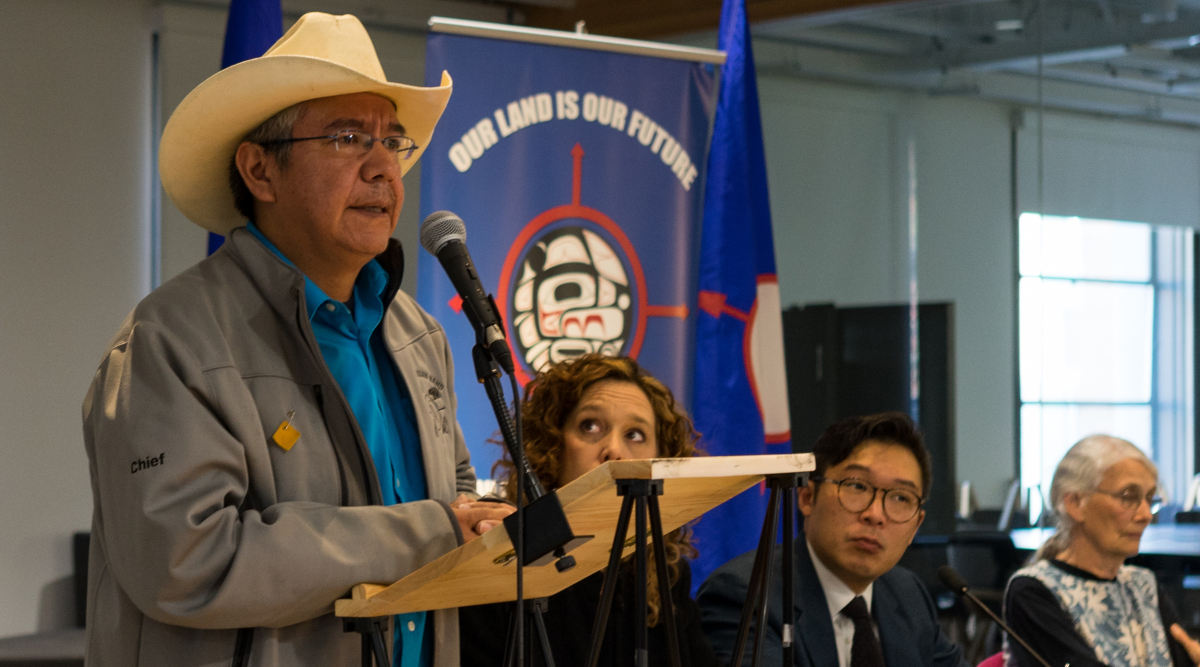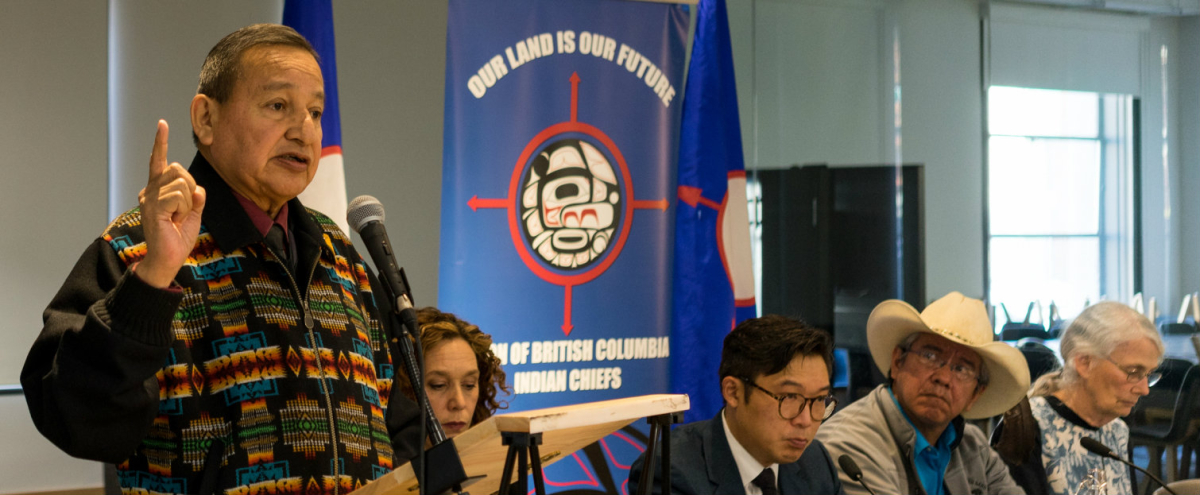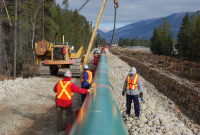Support strong Canadian climate journalism for 2025
Opponents of the Trans Mountain expansion project say the federal energy regulator is repeating mistakes that led the Federal Court of Appeal to quash the Trudeau government's approval of the major west coast oil pipeline. They said at a press conference in Vancouver Tuesday morning that the NEB is making the same mistakes as their last process and that if they continue to adhere to rushed deadlines and limit their scope of review, they will wind up back in court.
Representatives of former and current litigants, environmental groups, and affected First Nations held the press conference to raise red flags around a limited assessment of increased tanker traffic and what they see as a hasty rushed process that prevents meaningful consultation with affected First Nations.
The regulator, the National Energy Board (NEB), has restarted a review of the project as part of a federal process to address mistakes that were identified by the court in August.
Prime Minister Justin Trudeau's government confirmed on Oct. 3, after relaunching the review, that it wouldn't appeal the ruling, instead giving the NEB 22 weeks to complete its own assessment. The government also committed to consulting meaningfully with First Nations, and has not set any deadline to finish this part of the process.
But opponents, including First Nations and environmental groups formally participating in the new NEB review, say nothing has changed.
"We're astounded at the new NEB process that is more flawed than the process we fought so hard against when it was Kinder Morgan's pipeline project," said Grand Chief Stewart Phillip, President of the Union of BC Indian Chiefs. "It's disgusting, disgraceful and shameful."
The Federal Court of Appeal quashed the federal government’s approval of the troubled Trans Mountain expansion project on Aug. 30, after concluding that Trudeau’s cabinet made its decision without considering all evidence and failing in its legal duty to consult First Nations. The court decision also required the government to ask the NEB to redo a federal environmental evaluation and correct a “critical” mistake it made to ignore the consequences of increased oil tanker traffic off the coast of British Columbia. This includes assessing the impacts to endangered whales.
On Tuesday, Stewart and other Trans Mountain expansion opponents noted that the regulator has decided to only review impacts of the project within 12 nautical miles of Canada's territorial sea limit, as requested by the Alberta government, instead of considering Canada's exclusive economic zone which extends by 200 nautical miles.
They say this decision is flawed based on research showing that the habitat of the whales extends well beyond that limit. The NEB didn't initially provide a detailed explanation for its decision, but the regulator's chief environment officer, Robert Steedman, said it was based on comments sent to the regulator from interested parties, The Canadian Press reported on Oct. 12. On Tuesday, NEB spokesman James Stevenson said the Board will be "releasing reasons for these decisions shortly."
"Too little, too late"
“The NEB re-do review is too little, too late, and is yet another desperate, Hail Mary attempt to resuscitate a dead project,” said Grand Chief Phillip. “The NEB, in its characteristic arrogance, appears to believe they do not have to meaningfully address the clear direction provided by the Federal Court of Appeal in August to do in-depth, detailed work on the impacts of increased tanker traffic on the B.C. coast posed by the TMX (Trans Mountain expansion). First Nations have the right to provide their free, prior and informed consent on projects that impact them, and a rushed NEB re-do is not likely to yield such consent.”
The opponents made their plea just as Prime Minister Justin Trudeau and his cabinet deployed across the country to explain how they are planning to impose a new carbon tax scheme on polluters in the face of staunch opposition from conservative politicians who say they will scrap the policy, without offering any alternative policies to address climate change.
Trudeau has said that getting Trans Mountain built is a key part of his climate change plan since it would secure the support of Alberta for its own policies to reduce greenhouse gas emissions.
When reached for comment, Natural Resources Canada spokeswoman Vanessa Adams said in an email that the government "understands the importance of fighting climate change and protecting the environment while building a strong economy, which is why we are taking action such as putting a price on pollution, phasing out coal, investing in clean technologies, and making historic investments to protect our water and coasts under the Oceans Protection Plan."

The Trudeau government also appointed a former Supreme Court justice to oversee new Indigenous consultations on the Trans Mountain expansion.
In its redo process, the NEB imposed a five-and-a-half week deadline for participants in the new review to retain and brief an expert who will then produce a report. During the NEB’s last review of Trans Mountain, interveners were originally given seven months. The NEB has also yet to provide funding to community and local groups to be involved in this process, which makes hiring an expert all the more challenging, they said.
"The focus of the reconsideration is the application of the Canadian Environmental Assessment Act, 2012 and the Species at Risk Act to project-related marine shipping. The Board is confident in its ability to complete a thorough review of these matters as directed within the 155 days set by the Order in Council," said NEB spokesman James Stevenson in an email.
The federal review process generally allows for stakeholders to get government funding to ensure that they can get access to expertise and professional support needed to participate in the process.
Khelsilem, an elected Squamish Nation Councillor, said the Trudeau government "isn't upholding its promises to reconciliation by putting in timelines that don't allow for a fair analysis or fair process for First Nations." He said the nation expects a fair process based on science, and that proper review cannot be done hastily, but must make time and space for expert analysis. The government-imposed timeline of five weeks prevents meaningful assessment and therefore meaningful consultation with First Nations, he said.
Stevenson said in an email that the NEB announced on September 26 that it will hold a public hearing to reconsider aspects of its recommendation dealing with project-related marine shipping, and that the NEB later issued a hearing order setting out the steps and deadlines for the public hearings. He said at least 33 Indigenous groups became intervenors by applying or registering to participate.
"As the Prime Minister has said, no relationship is more important to our government than the one with Indigenous peoples," said Natural Resources Canada spokeswoman Vanessa Adams.
"The Federal Court of Appeal was clear that our government needed to do a better job consulting Indigenous peoples and to take into account the impact of marine shipping, and that is exactly what we are doing. Since announcing our plan to re-engage in Phase III consultations on the Trans Mountain expansion project, Minister Sohi has met and spoken directly with First Nations and Metis leaders, and will continue to engage with impacted Indigenous communities."
Meaningful consultations
Khelsilem's concerns are shared by Vancouver's new incoming mayor, former NDP MP Vancouver Kennedy Stewart, who was arrested in March for protesting the Trans Mountain expansion project.
Though mayor elect Kennedy Stewart was invited to the press conference, Tzeporah Berman, Program Director Stand.Earth, spoke on his behalf, saying there was a scheduling conflict that didn't allow for him to participate. Stewart directed Berman to let the press know he stands by his statements and actions in opposition to the Trans Mountain expansion that he committed to prior to becoming mayor.

Other opposition politicians also voiced their opposition to the current process, including Green Leader Elizabeth May who was arrested along side Kennedy Stewart for defying a court injunction and protesting the expansion in a restricted zone near the Trans Mountain terminal site in Burnaby, B.C.
"As an intervenor before the first round of Kinder Morgan hearings before the NEB, and now as an intervenor in the second round, I am deeply disturbed by the narrow focus and tight time line,” stated Green Party leader Elizabeth May, who called in to the press conference from Ottawa.
May added that the current process also appears to be failing to address the full impacts of tanker traffic as required by federal legislation on species at risk.
NDP MP Nathan Cullen, who also joined the news conference by phone from Ottawa, also expressed his skepticism.
“It’s for good reason that the old expression ‘to do the same thing over and over again but expecting different results is the definition of insanity’ is well used in Parliament. When it comes to Trans Mountain, the flawed and failing review process is an insult to anyone who believed the current government is any different than the last one,” stated NDP MP Nathan Cullen on the phone from Ottawa. “Meaningful consultation’ requires that the outcome isn’t predestined and that there’s a real intent at respect. Neither are true with this ‘new’ process announced by Mr. Trudeau.”
Berman, from Stand.Earth, described the situation within the NEB as a crisis, noting that Trudeau himself had identified this as a problem to fix during the 2015 election.
The Trudeau government currently has legislation under review by the Senate to change Canada's environmental laws and replace the NEB with a new organization. But before this legislation can be adopted by Parliament, the government is allowing the current federal regime, introduced by former prime minister Stephen Harper, to proceed with reviews in the meantime.
"This is the last gasp for a regulator so compromised that two of its members had to step down from the Energy East hearings in 2016 — one of whom now sits on the Trans Mountain panel," Berman said.
Editor's note: This story was updated at 3:30 p.m. Pacific Time with comments from the National Energy Board and Natural Resources Canada.






Comments
So Notley is sticking her nose into the NEB process: ``comments sent to the regulator by interested parties.`` Really, I mean Canada`s jurisdiction extends 200 nautical miles - so I have to conclude that the NEB's jurisdiction is also 200 nautical miles. Not 12. I would advise First Nations and environmentalists to commence legal action now. Any decision rendered by the NEB will be flawed.
I predicted exactly this. It was clear from right after the court decision that they were going to be doing exactly the same stupid crap that lost them the court decision, only more so.
Meanwhile, it seems likely Kenney boy is going to be premier of Alberta soon and he's not going to be on board with carbon taxes no matter what he's being given in return, so Trudeau's whole rotten "pipeline for tax peace" deal will fall through anyway. So where's his bogus rationale then?